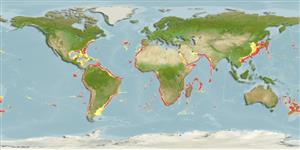Common names from other countries
sub class Elasmobranchii (ฉลามและกระเบน) (sharks and rays) >
Squaliformes (Sleeper and dogfish sharks) >
Etmopteridae (Lantern sharks)
Etymology: Etmopterus: Greek, ethmos, -ou = sieve or ethmoides bone + Greek, pteron = wing, fin (Ref. 45335).
More on author: Lowe.
Environment: milieu / climate zone / depth range / distribution range
นิเวศวิทยา
เกี่ยวกับทะเล,น้ำเค็ม สัตว์หน้าดินในเขตน้ำลึก; สัตว์น้ำที่อาศัยและอพยพภายในทะเลเท่านั้น (Ref. 51243); ระดับความลึก 0 - 1120 m (Ref. 106604), usually 400 - 700 m (Ref. 36731). Deep-water; 45°N - 55°S, 98°W - 171°W
Western Atlantic: northern Gulf of Mexico and southern Brazil to Argentina (Ref. 247, 6871); one specimen collected off the Guianas (Ref. 13608). Eastern Atlantic: Portugal to Namibia (Ref. 247, 127434). Also in oceanic waters between Argentina and South Africa (Ref. 247). Western Indian Ocean: South Africa, and Arabian Sea (Ref.85183). Western Pacific: Australia (Ref. 6871), New Zealand (Ref. 26346), and Japan (Ref. 247). Southeast Pacific: Amber Seamount, Nasca and Sala-y-Gomez.
Length at first maturity / ขนาด / น้ำหนัก / Age
Maturity: Lm 42.5, range 38 - 47 cm
Max length : 50.0 cm TL เพศผู้/กระเทย; (Ref. 36731)
เงี่ยงครีบหลัง (รวม) : 2; เงี่ยงครีบก้น: 0. Bladelike unicuspidate teeth in lower jaw and teeth with cusps and cusplets in upper jaw, relatively short snout, low, truncated denticles (Ref. 247). Blackish brown dorsally, with an obscure broad black mark running above, in front and behind pelvic fins (Ref. 247).
Found on or near the bottom of continental and insular slopes at depths from 275 to 1,000 m (possibly to 2,000 m); also oceanic in the south Atlantic from the surface to 710 m (Ref. 6871), possibly as deep as 1998 m (Ref. 58302). Feeds on fish eggs, lanternfish, squid, and other small dogfish (Ref. 5578). Ovoviviparous (Ref. 205). Utilized dried salted for human consumption and for fishmeal (Ref. 247).
Life cycle and mating behavior
Maturities | การสืบพันธุ์ | Spawnings | Egg(s) | Fecundities | ตัวอ่อน
Ovoviviparous (Ref. 247). Distinct pairing with embrace (Ref. 205).
Compagno, L.J.V., 1984. FAO Species Catalogue. Vol. 4. Sharks of the world. An annotated and illustrated catalogue of shark species known to date. Part 1 - Hexanchiformes to Lamniformes. FAO Fish. Synop. 125(4/1):1-249. Rome, FAO. (Ref. 247)
IUCN Red List Status (Ref. 130435)
CITES (Ref. 128078)
Not Evaluated
Threat to humans
Harmless
Human uses
การประมง: มีการค้าเพียงเล็กน้อย
เครื่องมือ
Special reports
Download XML
แหล่งที่มาจากอินเตอร์เน็ต
Estimates based on models
Preferred temperature (Ref.
115969): 5.3 - 13.6, mean 8.9 (based on 409 cells).
Phylogenetic diversity index (Ref.
82804): PD
50 = 0.5000 [Uniqueness, from 0.5 = low to 2.0 = high].
Bayesian length-weight: a=0.00355 (0.00230 - 0.00547), b=3.05 (2.92 - 3.18), in cm Total Length, based on LWR estimates for this species & Genus-body shape (Ref.
93245).
ระดับชั้นอาหาร (Ref.
69278): 4.2 ±0.4 se; based on diet studies.
ความสามารถในการกลับคืนสู่ปกติ (Ref.
120179): ต่ำ, เวลาต่ำสุดที่จะทำให้ประชากรเพิ่มขึ้นเป็น 2 เท่าใช้เวลา 4.5 - 14 ปี (Fec assumed to be <100).
Fishing Vulnerability (Ref.
59153): Moderate vulnerability (40 of 100).
